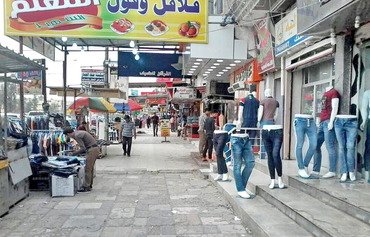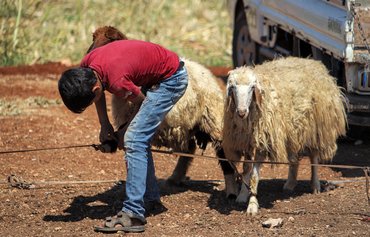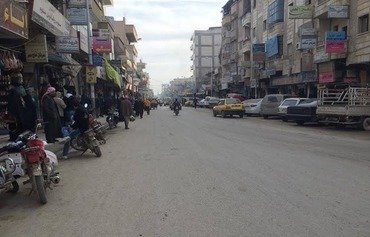Merchants in the Syrian city of al-Raqa are facing bankruptcy as the city endures its fourth year under "Islamic State of Iraq and the Levant" (ISIL) control and commercial activity continues to stall.
The region has come under tremendous pressure as a result of the group's occupation, and all roads that connect the city to other areas have been cut off due to the security situation .
The bulk of goods that do enter the city go to ISIL supporters and collaborators, unemployment is rampant and residents no longer have purchasing power.
The city on the north-eastern bank of the Tigris used to be an important commercial centre, not only for al-Raqa province, but for Syria as a whole, Syrian journalist Mohammed al-Abdullah told Diyaruna.
It used to be a hub for the exchange of goods and crops between the various regions, he said, but things gradually changed for the worse when ISIL arrived.
"Goods gradually began to disappear from the market after most of the roads that connect al-Raqa to other regions were cut off," he said.
The only merchants who are doing well amid the current conditions are ISIL elements and supporters, who receive the goods that reach the city and sell them or redistribute them to other merchants at grossly inflated prices, he said.
"Food supplies are scarce in the city," he added, noting that basic goods such as sugar, rice, vegetables and meat can command "outrageous prices".
"The winter season compounded the suffering of residents, who saw the prices of heating materials rise to 250 pounds ($1.62) per litre of fuel oil and up to 15,000 ($7) sometimes per cylinder of cooking gas," al-Abdullah said.
The prices of these goods "are raised at the instruction of ISIL 'emirs', who control the oil and gas wells and refineries and pay no mind to the crisis that civilians in the region are going through", he added.
Residents of rural al-Raqa used to shop at the city’s markets and bring their crops and livestock to sell there, he said, adding that without this activity, al-Raqa’s market "became just another market, only less important and poorer".
Ban targets children’s toys
"The latest decree by the group was directed at toy shop owners," said al-Raqa salesman Hamad al-Matar, using a pseudonym out of fear for his safety.
The missive banned the sale of toys with faces, "namely ordinary dolls that girls play with", as well as stuffed animals, he said, on the pretext that they are a form of idolatry.
"Al-hesba ('religious police') patrols are even raiding toy shops, confiscating banned toys and burning them before citizens in the market," al-Matar said.
In addition to the pain of watching their merchandise going up in smoke, he said, many shopkeepers are at the point of declaring "total bankruptcy".
"Many of those shops stock such goods ahead of the holiday when this merchandise is in high demand, and some had not yet paid for the merchandise and are obligated to pay now," he explained.
Despite their constrained financial circumstances, most families try to save a little money to buy toys for their children or the posters of sports heroes that are popular with adolescents, he said, adding that these are banned now as well.
ISIL controls money transfers
Money is not flowing into al-Raqa at present, said local merchant Wael Mustafa, who asked to use a pseudonym out of fear for his safety.
"Remittances sent by expatriates from the city to their parents from abroad have become almost non-existent, as [they] rarely get through because of the international restrictions imposed on the group's activities," he told Diyaruna.
ISIL has total control of all money transfer companies in the city, either directly or through the imposition of very high fees on every transaction, which in recent weeks has climbed to 30% of the value of the transfer, Mustafa said.
When ISIL first seized control of the region, money flowed in the market owing to the group's illegal trade in oil, agricultural crops and stolen antiquities, he said.
However, the "oil trade has become almost non-existent because of the airstrikes, which are now hitting the oil refineries in the region on a semi-daily basis, and the antiquities trade also has become non-existent due to the difficulty in moving them outside the country", he said.
As for agricultural crops, they have become scarce as farmers are reluctant to cultivate their land as the battles draw closer, Mustafa said.
All this has led to "rampant unemployment in the city, and almost everyone is now out of work, as there is not any kind of work that one can do anymore, except rarely", he added.

!['Islamic State of Iraq and the Levant' elements standing at the entrance of a shop in al-Raqa’s main market. [Photo courtesy of Mohammed al-Abdullah]](/cnmi_di/images/2017/03/02/7344-syria-raqa-market-600_384.jpg)






